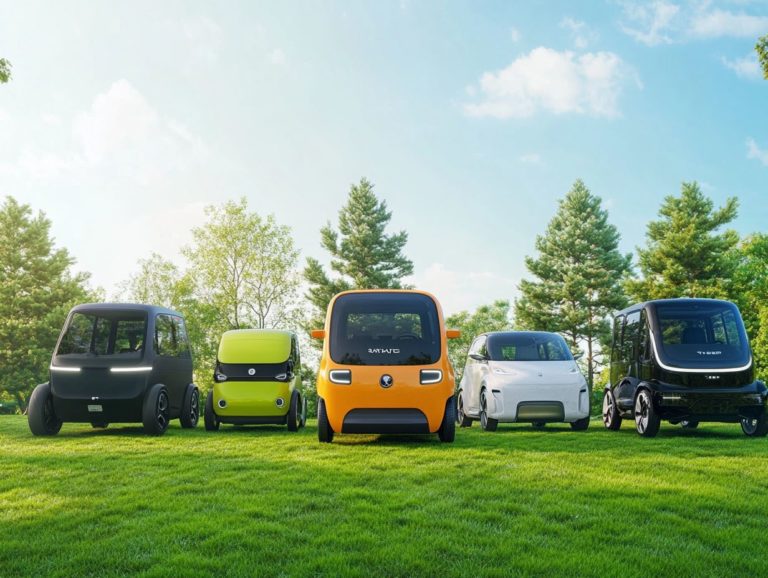The Relationship Between EVs and Energy Independence
As the world transitions toward sustainable transportation, electric vehicles (EVs) are becoming the focal point of discussions surrounding energy independence.
Let s explore what electric vehicles (EVs) are all about, the different types that exist, and their important part in reducing reliance on fossil fuels. This exploration highlights the benefits of EVs in lowering carbon emissions and enhancing energy efficiency while also addressing challenges such as infrastructure limitations and cost concerns.
It also examines government policies that support EV adoption and considers what the future may hold for this groundbreaking technology.
Dive in to discover how EVs can fundamentally reshape our energy landscape.
Contents
- Why EVs Matter:
- Understanding EVs (Electric Vehicles)
- Benefits of EVs for Energy Independence
- Challenges and Limitations of EVs
- Government Policies and Incentives for EVs
- The Future of EVs and Energy Independence
- How Electric Vehicles Will Revolutionize Energy
- Frequently Asked Questions
- 1. What is the relationship between electric vehicles (EVs) and energy independence?
- 2. How do electric vehicles play a role in achieving energy independence?
- 3. Are electric vehicles the only solution for achieving energy independence?
- 4. How do EVs impact the global energy market and energy independence?
- 5. Can switching to electric vehicles help with energy independence in the long run?
- 6. What role can government policies play in promoting the relationship between EVs and energy independence?
Why EVs Matter:
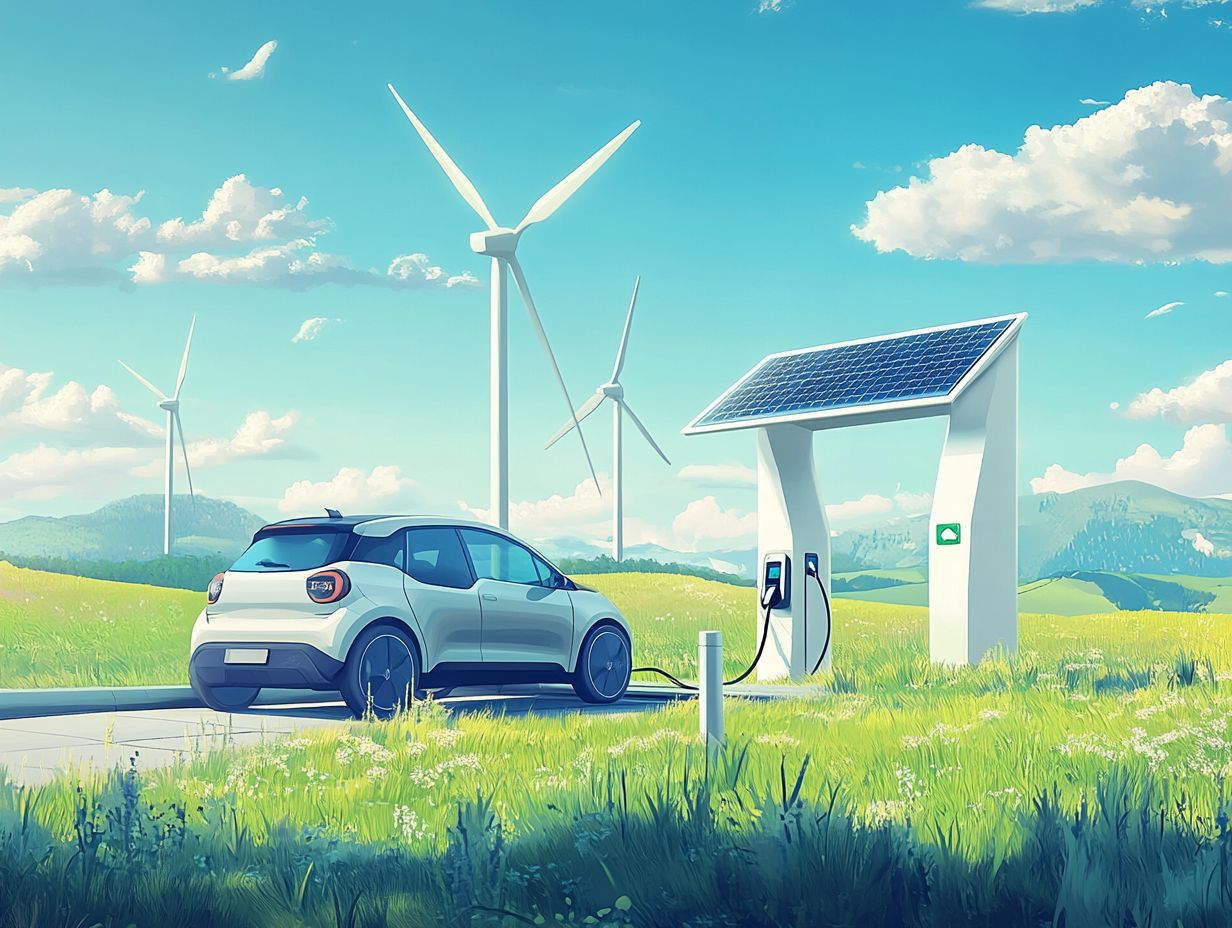
- EVs can greatly contribute to energy independence by reducing our reliance on fossil fuels.
- The adoption of EVs helps lower carbon emissions and promote energy efficiency.
- Challenges such as infrastructure, cost, and range still need to be addressed to fully realize the potential of EVs in achieving energy independence.
Understanding EVs (Electric Vehicles)
Understanding electric vehicles (EVs) is essential in today’s swiftly changing transportation landscape. With climate change concerns escalating and geopolitical tensions influencing global oil markets, the move towards electric vehicles serves a dual purpose: it tackles environmental challenges while boosting energy independence for nations like the United States.
Thanks to remarkable advancements in battery technology, electric models such as the Nissan Leaf and the Toyota Prius have gained considerable traction. This shift supports a more sustainable transportation system and plays an important part in significantly reducing your carbon footprint.
What are EVs?
Electric vehicles (EVs) represent a groundbreaking leap in transportation, utilizing electricity as their primary energy source and significantly cutting down on greenhouse gas emissions compared to traditional fossil fuel-powered vehicles.
This shift transforms your driving experience imagine silent, smooth acceleration replacing the disruptive roar of combustion engines. It aligns seamlessly with global efforts to embrace renewable energy sources. By tapping into electricity generated from wind, solar, or hydro, these vehicles actively contribute to a sustainable transportation ecosystem that prioritizes emissions reduction.
With advancements in battery technology and charging infrastructure, EVs play an important part in reducing urban air pollution, fostering healthier communities, and supporting broader governmental initiatives aimed at creating a greener energy future.
Types of EVs
You ll find that electric vehicles come in various forms, such as battery electric vehicles (BEVs), plug-in hybrid electric vehicles (PHEVs), and fuel cell electric vehicles (FCEVs). Each type brings its own advantages and plays a crucial role in reducing reliance on fossil fuels.
Battery electric vehicles operate solely on rechargeable batteries, making them incredibly efficient and minimizing their environmental impact. If you re looking for flexibility on longer journeys, plug-in hybrid electric vehicles are the way to go. They combine a traditional internal combustion engine with an electric propulsion system, allowing for reduced emissions without sacrificing convenience.
Fuel cell electric vehicles take a different approach by using hydrogen to generate electricity, with the only byproduct being water vapor. As the worldwide demand for energy independence continues to rise, incorporating these various EV types into the transportation ecosystem is essential for transitioning to renewable energy sources. This integration highlights their key role in paving the way for a sustainable future.
Benefits of EVs for Energy Independence
The shift to electric vehicles (EVs) presents a wealth of advantages that significantly bolster energy independence. By reducing reliance on fossil fuels and championing renewable energy sources, this transition plays a crucial role in addressing the challenges posed by climate change and the escalating costs of global energy.
Embracing EVs not only supports sustainable practices but also positions you at the forefront of a necessary evolution in transportation.
Join the electric vehicle revolution today for a cleaner, greener future!
Reducing Dependence on Fossil Fuels
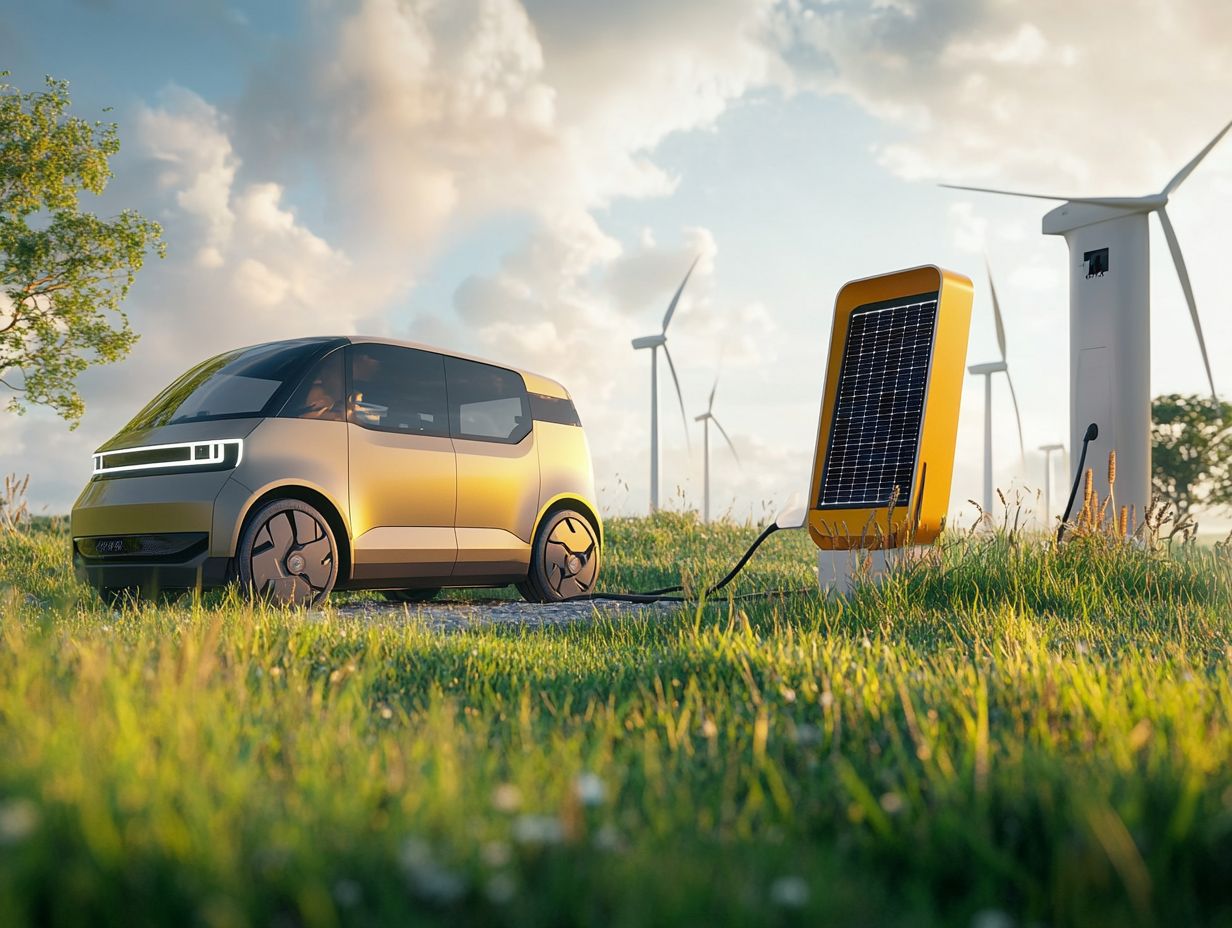
Electric vehicles (EVs) are game-changers for our future! They play a vital role in reducing dependence on fossil fuels and fostering energy independence. Furthermore, they significantly lower the carbon footprint linked to conventional fuel sources.
Transitioning to electric vehicles now is critical for combating climate change! Both you and your government can drastically cut greenhouse gas emissions, which is essential since transportation contributes nearly 29% of total greenhouse gas emissions in the U.S.
As more people adopt EVs, reliance on imported oil diminishes, which bolsters national security. Additionally, it creates green jobs that support local economies. By integrating renewable energy sources like solar and wind into the EV charging infrastructure, you contribute to a sustainable cycle that reduces emissions while enhancing energy efficiency, ultimately paving the way for a more eco-friendly transportation future.
Lowering Carbon Emissions
One of the most compelling benefits of electric vehicles lies in their remarkable ability to reduce carbon emissions. This is an essential step in the fight against climate change and the pursuit of a successful energy transition.
By transitioning from traditional gasoline-powered engines, you are actively contributing to a cleaner environment. Research shows that, on average, electric vehicles emit 50% less carbon dioxide over their lifetime compared to conventional vehicles. The Union of Concerned Scientists has found that even when factoring in emissions from electricity generation, electric vehicles still come out ahead, especially as our power grid relies more on renewable energy sources.
As cities and countries aim for ambitious climate objectives, adopting electric vehicles becomes a crucial strategy for shrinking the transportation sector’s carbon footprint and nurturing sustainable urban spaces.
Promoting Energy Efficiency
Electric vehicles enhance energy efficiency through cutting-edge technology and renewable energy sources. This ultimately leads to lower energy costs and reduced health expenses tied to air pollution.
Integrating these vehicles into your daily routine not only aligns with the increasing focus on sustainable energy practices but also highlights your commitment to a cleaner environment. As more individuals make the switch to electric vehicles, reliance on fossil fuels diminishes, resulting in a notable reduction in greenhouse gas emissions.
Harnessing solar and wind energy to power these vehicles amplifies their advantages. This transition not only brings substantial financial savings due to decreased operational costs but also positively impacts public health by improving air quality and mitigating respiratory issues associated with traditional gasoline-powered cars.
Challenges and Limitations of EVs
Despite the many benefits that electric vehicles offer, several challenges and limitations hinder their widespread adoption:
- Infrastructure concerns
- Accessibility issues
- High upfront costs
- Battery life challenges
Infrastructure and Accessibility
The success of electric vehicles relies heavily on the development of a robust infrastructure, particularly a widespread network of charging stations that enhances accessibility for all users. This infrastructure is crucial not just for current electric vehicle owners but also for potential buyers who may hesitate due to concerns about charging availability.
Adequate charging stations, thoughtfully positioned in urban areas and along major highways, can significantly ease the fear of running out of battery power before reaching a charging station. Public policies are instrumental in facilitating the installation of these necessary facilities, paving the way for local governments and private entities to invest in renewable energy solutions.
By addressing infrastructure shortcomings and prioritizing equitable access, policymakers can cultivate a supportive environment that promotes EV adoption. This approach ensures that all communities, especially those underserved, have the opportunity to embrace cleaner transportation alternatives.
Learn more about how you can make the switch to electric vehicles today!
Cost and Affordability
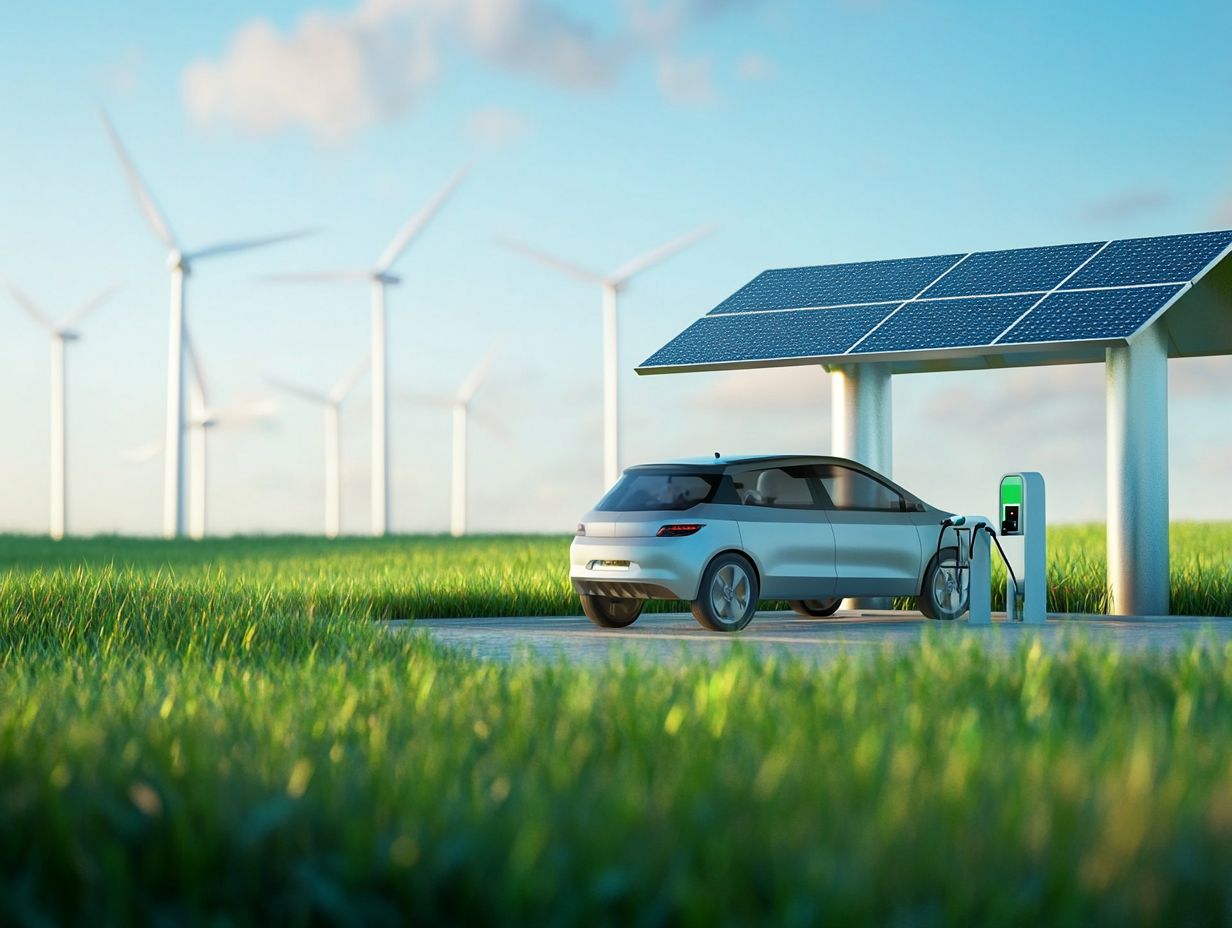
When considering electric vehicles, the cost and affordability are key factors. You can’t overlook the upfront costs, but think about the long-term savings! These savings on fuel and attractive tax credits can certainly help balance the initial investment.
Owning an electric vehicle means more than just the upfront costs. You also benefit from savings that add up over time due to lower fuel expenses. Many governments offer incentives like tax credits and rebates that can significantly reduce the purchase price. Plus, electric vehicle owners typically enjoy lower maintenance costs compared to traditional gas-powered cars.
As electric vehicle technology evolves, the appeal of lower operating expenses is hard to resist. Switching from gasoline-powered vehicles becomes not only an environmentally conscious choice but also a financially smart one.
Range and Battery Life
The range and battery life of electric vehicles are crucial for boosting consumer confidence and improving overall transportation efficiency.
Recent advancements have greatly improved how much energy a battery can store, enabling longer journeys without frequent charging. This progress eases what s known as “range anxiety” for potential EV buyers, encouraging manufacturers to innovate with lighter and more compact designs.
With the rise of ultra-fast charging stations, the time spent at charging points has been drastically reduced, making electric vehicles more convenient for everyday use. These developments are paving the way for a sustainable transportation system, reducing emissions and supporting greener urban mobility solutions.
Government Policies and Incentives for EVs
Government policies and incentives play a substantial role in your decision to adopt electric vehicles. They offer tax credits and grants that make EVs more financially appealing, helping you consider this sustainable choice.
Supporting the Adoption of EVs
Encouraging the adoption of electric vehicles is vital for achieving energy independence and cutting greenhouse gas emissions. This requires strong government policies and incentives.
By offering financial incentives like tax credits, rebates, and grants, authorities can make EVs more affordable for a broader audience. Investments in charging infrastructure are equally important; a more extensive network reassures potential users about the convenience of electric mobility.
Public awareness campaigns are essential for educating communities about the benefits of EVs while highlighting the latest technological advancements. This comprehensive approach not only motivates you to explore electric options but also fosters a culture of sustainability.
The Future of EVs and Energy Independence
The future of electric vehicles is bright! Exciting advancements in technology and increased investments in renewable energy sources are setting the stage for a more sustainable transportation system.
Embracing these changes can lead to a cleaner, more efficient way of traveling that aligns with your values for a greener planet.
How Electric Vehicles Will Revolutionize Energy
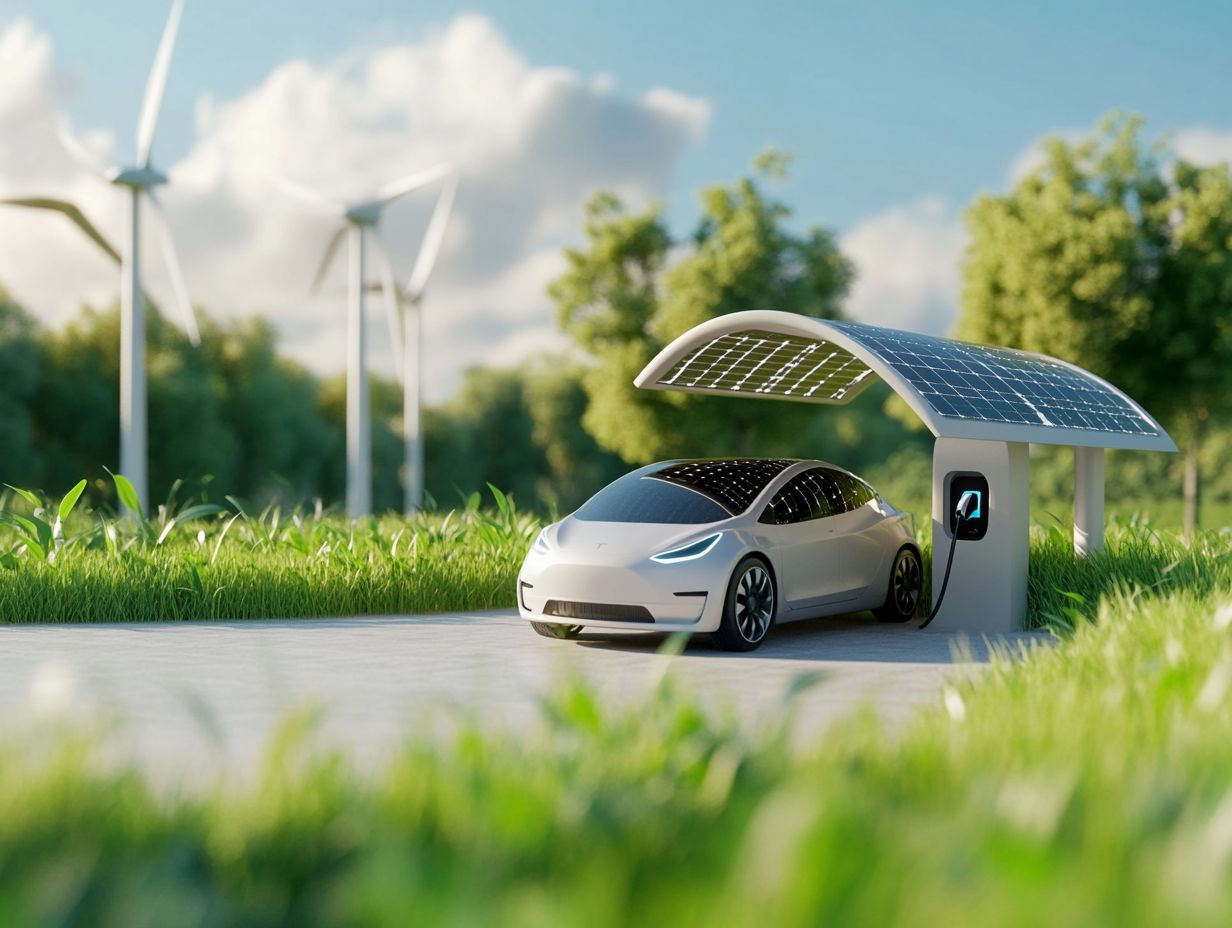
The widespread adoption of electric vehicles is poised to significantly impact the energy industry by diminishing the demand for fossil fuels. It will also broaden reliance on renewable energy sources. As you, along with many consumers, shift towards electric transportation, energy providers will need to adapt their strategies to accommodate this evolving landscape.
The rise of electric vehicles will require an expansion of charging infrastructure. Additionally, there will be a need for innovative energy solutions that prioritize sustainability. This transformation may lead to decreased profitability for traditional fossil fuel industries, prompting them to diversify into renewable sectors like solar and wind power.
As the grid evolves to meet rising energy demands, expect a stronger emphasis on advanced tools that help manage energy use better and energy storage solutions to ensure a reliable and efficient supply of clean energy.
Frequently Asked Questions
1. What is the relationship between electric vehicles (EVs) and energy independence?
The use of EVs can reduce our dependence on fossil fuels, contributing to energy independence. As EVs run on electricity, they can be powered by renewable sources such as solar or wind energy, decreasing reliance on non-renewable resources.
2. How do electric vehicles play a role in achieving energy independence?
By using electricity instead of gasoline or diesel, EVs can help reduce a country’s overall energy consumption. This shift can decrease oil imports, promoting energy independence and reducing reliance on foreign energy sources.
3. Are electric vehicles the only solution for achieving energy independence?
No, electric vehicles are not the only solution for energy independence. They are one of many sustainable options available, along with renewable energy sources, energy efficiency measures, and reducing overall energy consumption.
4. How do EVs impact the global energy market and energy independence?
The increasing demand for electric vehicles can lead to a decrease in oil demand, impacting the global energy market. This shift towards EVs can also reduce dependence on foreign oil, promoting energy independence for countries.
5. Can switching to electric vehicles help with energy independence in the long run?
Yes, switching to electric vehicles can have a long-term impact on energy independence. As technology advances and renewable energy sources become more prevalent, EVs can become even more sustainable and contribute to achieving energy independence.
6. What role can government policies play in promoting the relationship between EVs and energy independence?
Government policies can play a crucial role in promoting the adoption of EVs and achieving energy independence. Policies such as tax incentives, subsidies, and regulations can encourage consumers to switch to EVs and invest in renewable energy sources, promoting a more sustainable and independent energy future.
Imagine a future where electric vehicles lead the charge for energy independence! Act now to embrace electric vehicles and renewable energy your choices today shape tomorrow’s energy landscape!




